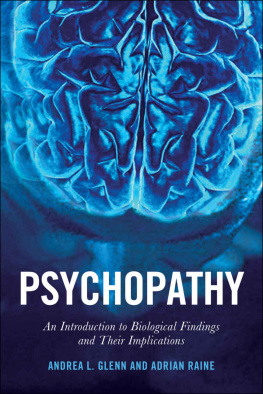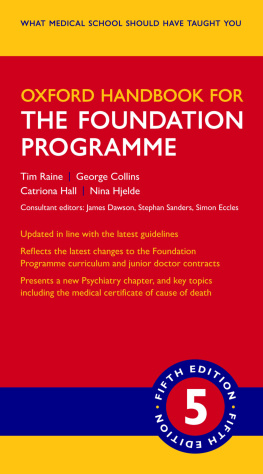Raine Adrian - Psychology
Here you can read online Raine Adrian - Psychology full text of the book (entire story) in english for free. Download pdf and epub, get meaning, cover and reviews about this ebook. year: 2014, publisher: NYU Press, genre: Romance novel. Description of the work, (preface) as well as reviews are available. Best literature library LitArk.com created for fans of good reading and offers a wide selection of genres:
Romance novel
Science fiction
Adventure
Detective
Science
History
Home and family
Prose
Art
Politics
Computer
Non-fiction
Religion
Business
Children
Humor
Choose a favorite category and find really read worthwhile books. Enjoy immersion in the world of imagination, feel the emotions of the characters or learn something new for yourself, make an fascinating discovery.
- Book:Psychology
- Author:
- Publisher:NYU Press
- Genre:
- Year:2014
- Rating:4 / 5
- Favourites:Add to favourites
- Your mark:
- 80
- 1
- 2
- 3
- 4
- 5
Psychology: summary, description and annotation
We offer to read an annotation, description, summary or preface (depends on what the author of the book "Psychology" wrote himself). If you haven't found the necessary information about the book — write in the comments, we will try to find it.
Psychology — read online for free the complete book (whole text) full work
Below is the text of the book, divided by pages. System saving the place of the last page read, allows you to conveniently read the book "Psychology" online for free, without having to search again every time where you left off. Put a bookmark, and you can go to the page where you finished reading at any time.
Font size:
Interval:
Bookmark:
PSYCHOPATHY
PSYCHOLOGY AND CRIME
General Editors: Brian Bornstein, University of Nebraska, and Monica Miller, University of Nevada, Reno
The Perversion of Youth: Controversies
in the Assessment and Treatment
of Juvenile Sex Offenders
Frank C. DiCataldo
Jury Decision Making: The State of the Science
Dennis J. Devine
Deviant and Criminal Behavior
in the Workplace
Edited by Steven M. Elias
Media and Criminal Behavior
Christopher J. Ferguson
I Said I Did It, But I Didnt: The
Psychology of False Confessions
G. Daniel Lassiter, Christian A.
Meissner, and Allison D. Redlich
Psychopathy: An Introduction to Biological
Findings and Their Implications
Andrea L. Glenn and Adrian Raine
An Introduction to Biological Findings and Their Implications
Andrea L. Glenn and Adrian Raine

NEW YORK UNIVERSITY PRESS
New York and London
www.nyupress.org
2014 by New York University
All rights reserved
References to Internet websites (URLs) were accurate at the time of writing. Neither the author nor New York University Press is responsible for URLs that may have expired or changed since the manuscript was prepared.
Library of Congress Cataloging-in-Publication Data
Glenn, Andrea L.
Psychopathy : an introduction to biological findings and their implications / Andrea L. Glenn and Adrian Raine.
pages cm. -- (Psychology and crime)
Includes bibliographical references and index.
ISBN 978-0-8147-7705-3 (cloth : alk. paper) -- ISBN 978-0-8147-4544-1 (pbk. : alk. paper) 1. Antisocial personality disorders. 2. Antisocial personality disorders--Genetic aspects. 3. Psychopaths. 4. Mental illness--Genetic aspects. I. Raine, Adrian. II. Title.
RC555.G54 2014
616.8582--dc23
2013039338
New York University Press books are printed on acid-free paper, and their binding materials are chosen for strength and durability. We strive to use environmentally responsible suppliers and materials to the greatest extent possible in publishing our books.
Manufactured in the United States of America
10 9 8 7 6 5 4 3 2 1
Also available as an ebook
Dedicated to Yu Gao, Robert Schug, and Yaling Yang.
In November 2009, evidence from functional magnetic resonance imaging (fMRI), a technology used to approximate brain functioning, was presented for the first time in a criminal court case. The defendant, Brian Dugan, was already serving two life sentences for murders he committed in the 1980s, and was now on trial for an earlier murder in which he had kidnapped a 10-year-old girl, raped her in the back seat of his car, and beat her to death. Brain imaging evidence was used to argue that Dugan, a highly psychopathic individual, demonstrated deficits in brain functioning that contributed to his extremely violent behavior, and therefore he should not be sentenced to death.
The case incited much debate, not only about what this type of brain imaging evidence can and cannot tell us about an individual, but also regarding the general idea that psychopaths, who are able to distinguish between right and wrong, may be excused for their behavior because of how their brains function. Dugans trial illustrates the ways in which biological research on psychopathy is gaining traction in the public domain and beginning to have real-world effects. As we learn more from this research, new questions are arising. How much control does a psychopath have over his or her behavior? How much of that behavior is influenced by biology versus the environment? If research shows that the brains of psychopaths are different, what chance do we have of preventing these individuals from causing harm?
The prevalence of psychopathic personality traits takes a major toll on society. In criminal populations, offenders with psychopathic traits are responsible for a disproportionate amount of crime, particularly violent crime. In the rest of society, psychopathic traits are a driving force behind much of the corruption, exploitation, manipulation, and deception that occurs on both large and small scales. Psychopathy causes undue physical, emotional, and financial trauma in the lives of countless individuals. Because of this, in recent years, much attention has been devoted to understanding psychopathy, including identifying the ways in which the biology of these individuals may be different, and how these differences lead to the development of psychopathic traits.
Unlike much of the research in the field of criminology, which has focused primarily on the social causes of crime, early researchers in the scientific study of psychopathy took a particular interest in examining the biological correlates of the disorder, and this biologically based approach has continued among many researchers in the field. Studies using brain imaging, skin conductance recordings, and other biological methods have identified differences between individuals with and without psychopathic traits, and behavioral genetics studies have determined that there is a significant genetic contribution to the disorder.
The purpose of this book is to provide an overview of this biologically based research on psychopathy, which has spurred the interest of scholars in many fields and is beginning to have real-world applicability. To those who are not familiar with biological methods, it may be difficult to sort through descriptions of complex technologies and statistical methods, learn the role of dozens of brain regions, hormones, and neurotransmitters, and gain a clear understanding of what the research can and cannot tell us about psychopathy. A goal of this book is to help scholars navigate this literature and to summarize some of the key findings in biological research. In addition, we also want to clarify many of the misunderstandings that often arise regarding the purpose of biological research and how findings should be interpreted.
Unsurprisingly, biologically based research on crime has led to much debate over issues such as free will, criminal responsibility, and punishment. This book aims to provide a context for understanding this research, to discuss the ethical issues related to it, and to demonstrate the ways in which understanding biological factors, in addition to social and environmental factors, may help us to solve the problem of psychopathy in the future.
Although the term psychopath is used colloquially in many different contexts, psychopathy is a personality disorder describing individuals with a specific set of traits. Interpersonally, these individuals are described as grandiose and self-centered; they come across as having an exaggerated sense of self-importance and tend to blame others for their failures and shortcomings. They readily take advantage of others using charm, manipulation, and deception. Their emotions tend to be shallow and insincere. They experience little guilt or remorse when they harm others. They have a pronounced lack of empathy and are described as callous and cold. They are also described as being fearless and tend to be more reckless and take risks in several domains. They have diminished concerns about punishment, physical injury, or social repercussions. Psychopaths are impulsive and seek reward and novelty. In life they are often irresponsible and fail to make appropriate life plans. They tend to have a volatile temperament and can easily become irritable and hostile. They show disregard for social norms and frequently engage in behavior that would be considered immoral to most. The observation that this constellation of traits could be identified in individuals again and again, albeit in different forms, led to the idea that these traits represent a single disorder.
Next pageFont size:
Interval:
Bookmark:
Similar books «Psychology»
Look at similar books to Psychology. We have selected literature similar in name and meaning in the hope of providing readers with more options to find new, interesting, not yet read works.
Discussion, reviews of the book Psychology and just readers' own opinions. Leave your comments, write what you think about the work, its meaning or the main characters. Specify what exactly you liked and what you didn't like, and why you think so.










